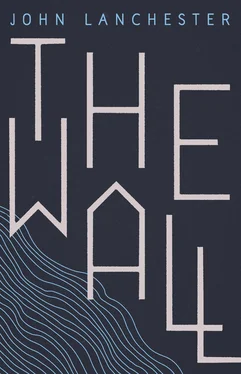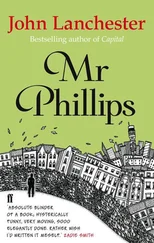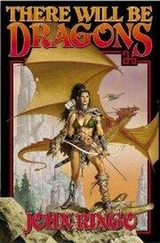‘This had better be good,’ he said. I handed him a water bottle and pointed into the middle distance as we swayed up and down. He saw the lights as we got to the top of the second set of swells. He said nothing and looked at them for a while as they came in and out of view. I noticed he too was taking some time before he felt sure he could trust his senses.
‘What I’m wondering is, if you think about who that might be, how many of the options are good for us?’ I said.
He nodded. We stood at the prow and looked into the distance while the boat bucked up and down on the swell and the lights winked on, winked off. Once I had had a few chances to study the lights I thought I could see they were arranged in a triangular pattern of five, one at the top and two lower down on each side.
‘Same. Guards probably aren’t out here at this time, but if they are and they see us, they’ll sink us straight away, no question. So we can’t go anywhere near them if they’re Guards. If they’re Others, how come they’re making such a spectacle?’
A boat full of Others who felt confident enough to be fully illuminated on the sea in the middle of the night – to be that unfrightened, they would have to be very frightening.
‘So we leave them be?’
He thought for a moment. It felt impossible that we would encounter the first sign of life out here, the first sign of company and possible salvation, and turn away from it. But when we thought about it, saw the risks, there was nothing else we could do.
‘Plus, I think they’re further away than they look. The horizon at sea level is about five K. The swell is coming from that direction. That’s a lot of rowing into a lot of waves.’
‘And only three of us to do the rowing.’
We looked at each other. We had been physically inactive for six weeks while we were waiting for sentence, and the rowing was hard. My hands were blistered and split and I was getting out of breath within minutes. Even if we wanted to row to the boat we might not be able to do it.
‘OK. Thanks. Go back to sleep,’ I said.
Hughes started to go back towards the covered part of the lifeboat. He stopped.
‘In a few days we may be so desperate we have no choice,’ he said.
‘I know,’ I said.
——
So this was life at sea. After the sentences were passed, we were taken in another lorry to another barracks. This time we travelled in handcuffs. I imagine the authorities’ thinking was that we now had nothing to lose so were more likely to make a run for it. That lorry journey was the worst moment of my life so far, worse than the moment of sentencing, worse even than when I knew the breach had happened and the Others had got away. I knew what the rules of the Wall were – like everyone else, I had known them my whole life. I don’t remember having them explained to me because there was no time before the rules, before the facts of life: the sun comes up in the morning and goes down at night; if you throw something in the air, gravity makes it come back down; if the Others get over, you get put to sea. And yet, for all that, I felt sick with the injustice of it. Physically sick. I knew for certain that I, that we, had done nothing wrong. More: I had done everything I could to guard the Wall to the best of my capabilities. I had fought hard and watched my friends die. We all had. And this was our reward.
I had heard the word ‘despair’ and thought I knew what it meant; thought also that it was one of those states of mind that resembles a weather system, something which sets in and then you live with it or under it. Now I found that despair can also be something that happens to you, that it can hit you in a single moment. And then it settles down with you for the duration. This is the thought I had in those days: that at some time in our lives we should, all of us, take some time to think about the worst possible thing that we can imagine happening to us. Your worst fear: track it down inside yourself. Take a good look at it. And face the fact that it will happen. The thing you dread most will happen. When it does, the name of the thing you’re feeling is despair.
Our guards offered us the opportunity to write letters to our ‘loved ones’. This wasn’t a special dispensation: it was clear that there was a protocol, agreed procedures, for occasions such as this. Agreed procedures for the worst thing that could ever happen to a person. In my case ‘loved ones’ meant my parents, and I decided I didn’t want to write to them, because I had nothing to say. Hifa talked me out of that. I put down some platitudes about being sorry, even though I wasn’t. I said I loved them, even though I didn’t, at least not in that moment. But I felt better for having written the letter.
We stayed in that new barracks for several days and one by one were brought to the medical centre and put under general anaesthetic while we had our chips removed. No biometric ID, no life. Not in this country. No turning back … After the operation we were held in recovery for a day, then returned to barracks. I could feel an itch deep in my arm where the chip had been and when I asked the others said they had the same feeling. A phantom chip. On the sixth afternoon, Hughes and Hifa and I were called and taken to another lorry; we’d have said goodbye to Yos and the other Defenders, if we’d known that was the last time we’d see them. From the angle of the light through the side of the vehicle I got the impression that we were heading south. We were driven until it was dark. Another barracks, but this time we were there hardly any time at all, an hour at most, before some Guards came into the room. From the look on their faces I could see this was what the Help had called kuishia : the ending. They seemed sad rather than angry; also implacable. We were taken down a series of concrete tunnels and then suddenly were out in the open air, and a Guard ship was waiting, with a lifeboat tied to the side. As soon as I saw it I realised it was going to be ours. We were led across a gangway to the ship. The Guard captain was waiting for us and he, weirdly or generously, I’m still not sure which, maybe both, saluted us and shook our hands. The ship cast off and we headed out to sea and we were led downstairs to a small unfurnished cabin and the door was locked behind us.
Up to that point my despair had left me numb to other feelings. Despair, grief, numbness, blankness. But not much else. I felt there was nothing I could do, and as a corollary (maybe) that there was therefore nothing else that it was necessary to feel. Everything that happened had been inevitable. Now and for the first time, I felt afraid, very very afraid. The boat would be lowered into the water and we would be lost, with the same complete lack of agency we had had ever since the night of the attack. The feeling that I had been relying on to keep me numb – that there was nothing I could do – suddenly became a source of overmastering fear. There’s nothing you can do. That thought can be a comfort, or it can be a terror. Panic, the need to flee, the impossibility of fleeing, the desperate need to escape combined with the certainty that you can’t escape, the sense that you are going to die of dread right there in that moment. My heart was beating fast and erratically. There was no air in the cabin. The lights had been turned up and were flickering. I was frying in my clothes, where I’d felt cold only seconds before. Hifa saw me freaking out and put a hand on my arm. I flinched, as if I’d had an electric shock, then thought, why am I flinching, and that new idea was just enough, turned my attention just enough, to allow me to start slowing down.
‘It’s OK,’ said Hifa, which was so not true it was a help. She wasn’t looking at her best, pale and shaky, which turned out to be the start of her seasickness.
Читать дальше












